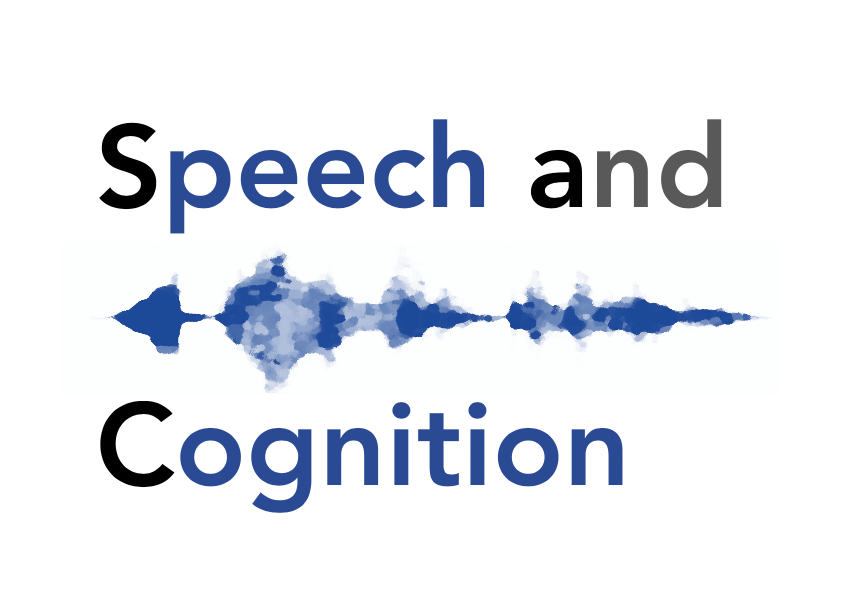


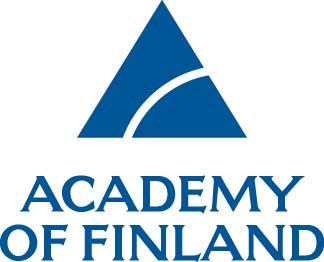

Our research is currently supported by grants from Research Council of Finland and Kone Foundation, CONVERGENCE grant from Jane and Aatos Erkko Foundation to Tampere University, and by local support from Tampere University.
Ongoing and recent research projects
| Linking Age-Dependent Changes in Caregiver Speech to Infant Language Development (LINKAGE-SPEECH) |
Infant language acquisition is commonly studied using so-called daylong audio recordings collected from their everyday environments. Manual analysis of such recordings is not feasible due to the sheer scale of the data, limiting our ability to learn from these realistic datasets. LINKAGE-SPEECH project develops more accurate and reliable tools for processing child-centered audio recordings, thereby greatly expanding the possibilities to study child language experiences using such data. In addition to better analysis tools, the project will result in new methods to assess reliability of the tools across diverse scenarios. These technical contributions will then be used to study age-dependent linguistic properties of child-directed speech using large amounts of naturalistic audio data from longitudinal corpora on Finnish an English, including comparisons between the languages, as well as studying the connections between properties of caregiver speech and consequent infant language development. This project is funded for 2025–2029 by Research Council of Finland. |
| Modeling Child Language Development using Naturalistic Data at a Scale (L-SCALE) |
The aim of L-SCALE is to enable development of comprehensive computational models of child language development by tackling two major challenges: 1) creation of large-scale naturalistic training datasets for computational modeling, and 2) development of model evaluation protocols that enable systematic comparison of model learning to those of real infants, including derivation and comparison of developmental trajectories of models and infants. Besides establishing new model training and evaluation protocols, the project will explore feasibility of self-supervised representation learning algorithms as models of infant learning. The project will also investigate modeling of individual variation in language learning. This project is funded for 2022–2026 by Kone Foundation. |
| Computational Basis of Contextually Grounded Language Acquisition in Humans and Machines (LangMod) |
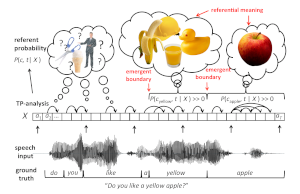 The project aims to understand how human children learn their native language simply by interacting with their environment,
and how the same learning principles could be utilized in the development of intelligent machines that could understand speech.
The focus is on the connection between spoken language and the communicative environments in which language learning takes place,
that is, how perception and learning of linguistic patterns is coupled to the meaning of the speech in the given context.
The project aims to understand how human children learn their native language simply by interacting with their environment,
and how the same learning principles could be utilized in the development of intelligent machines that could understand speech.
The focus is on the connection between spoken language and the communicative environments in which language learning takes place,
that is, how perception and learning of linguistic patterns is coupled to the meaning of the speech in the given context.
This project was funded for 2018–2023 by Academy of Finland (grants no. 314602, 320053 and 345365). |
| Analyzing the Child Language Experiences Around the World (ACLEW) |
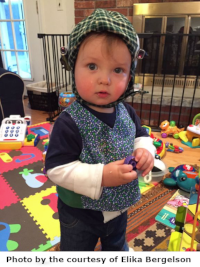 The ACLEW project seeks to build a cross-culturally valid description of children's real-world early language experiences by analyzing large-scale daylong audio
recordings from a diverse sample of infants around the world, collected with microphones worn by infants throughout their daily lives. Our primary role in the project is to develop automated tools for analysis of speech and language patterns
from the collected recordings, such as measuring the quality and quantity of speech in the data.
The ACLEW project seeks to build a cross-culturally valid description of children's real-world early language experiences by analyzing large-scale daylong audio
recordings from a diverse sample of infants around the world, collected with microphones worn by infants throughout their daily lives. Our primary role in the project is to develop automated tools for analysis of speech and language patterns
from the collected recordings, such as measuring the quality and quantity of speech in the data.
The project is carried out in collaboration with Björn Schuller from Imperial College London (UK), Florian Metze from Carnegie Mellon University (USA), Frank Rudzicz from Uni. Toronto (Canada), Alex Cristia and Emmanuel Dupoux from Ecole Normale Superieure (France), Elika Bergelson from Duke University (USA), Marisa Casillas from Max Planck Institute for Psycholinguistics (Netherlands), Celia Rosemberg from CONICET (Argentina), and Melanie Soderstrom from Uni. Manitoba (Canada). This project was funded for 2017–2020 by Academy of Finland (grant no. 312105) as a part of Digging Into Data -challenge of Trans-Atlantic Platform for Social Sciences and Humanities. See https://sites.google.com/view/aclewdid/home for more information. |
| Rhythms in Infant Brain: Wearables for Computational Diagnostics and Mobile Monitoring of Treatment (RIB1 and RIB2) |
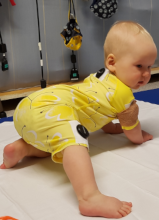 The RIB project aims to develop intelligent wearables for monitoring neurophysiological development of babies. By using accelerometers integrated into comfortable textiles, infant movement patterns can be used
to detect patterns of spontaneous movements, reflecting the integrity of the underlying cognitive system. In parallel, we are developing methods for robust analysis of telephone speech in order to detect and monitor
health and wellbeing of speakers based on their voice and communication patterns.
The RIB project aims to develop intelligent wearables for monitoring neurophysiological development of babies. By using accelerometers integrated into comfortable textiles, infant movement patterns can be used
to detect patterns of spontaneous movements, reflecting the integrity of the underlying cognitive system. In parallel, we are developing methods for robust analysis of telephone speech in order to detect and monitor
health and wellbeing of speakers based on their voice and communication patterns.
The project is carried out in collaboration with Prof. Sampsa Vanhatalo from Helsinki University Central Hospital (infant neurophysiology), Prof. Andre Sourander from University of Turku (adolescent psychiatry), and Dr. Elina Ilen from The School of Arts, Design and Architecture of Aalto University (smart wearables design). This project was funded for 2018–2022 by Academy of Finland (grants no. 314573 and 335872) and Lastentautien tutkimussäätiö as a part of Science to Health ("TERVA") programme of Academy of Finland. |